This is an automatically translated article.
Creatine is a type of supplement, commonly used mainly in sports and bodybuilding. Numerous studies have shown that creatine can increase strength, muscle mass, and high-intensity exercise performance. Furthermore, creatine also provides certain benefits for the brain and the whole body, such as preventing neurological diseases, and improving brain function. This supplement is considered safe for most people, and does not cause serious side effects when used.1. Increase the amount of phosphocreatine
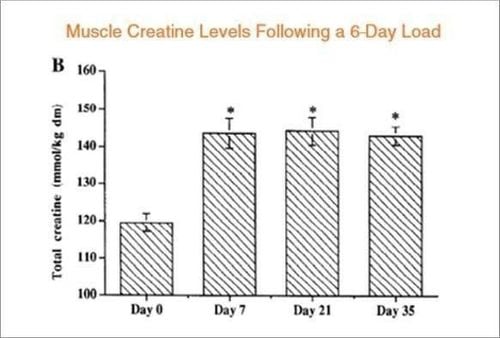
In addition, the greater the amount of phosphocreatine stored in the brain, the more effective it is in controlling the symptoms of some diseases, and neurological conditions that affect the ability to think.
As age increases, the amount of phosphocreatine stores also decreases. This condition can also happen to people with insomnia. In addition, people who follow a plant-based diet have a higher risk of phosphocreatine depletion, since meat is the main source of creatine.
From the chart above, the average person will increase their phosphocreatine stores by about 20% after taking 20 grams of creatine per day, and continuously for 6 days.
However, people who already have high creatine levels may not notice much change or increase in the amount of phosphocreatine stored in the body. At this point, supplements may provide little or no benefit.
2. Can double muscle mass
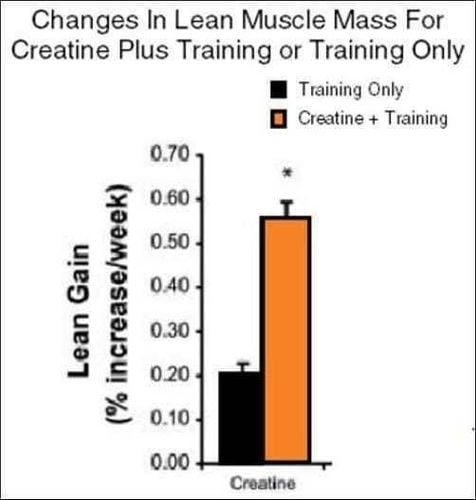
Get these benefits largely through processes, such as changes in muscle cells, hormones or some other biological function of the body.
From the chart above, adding creatine will double the amount of muscle gain per week compared to exercise alone.
3. Increase muscle fiber size
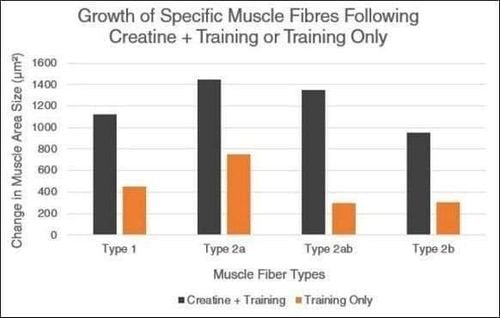
The chart above shows that supplementing with creatine increases muscle fiber growth by up to 300% compared to regular exercise alone. Results after 12 weeks of the study also found that total body mass doubled.
4. Improve weight training performance
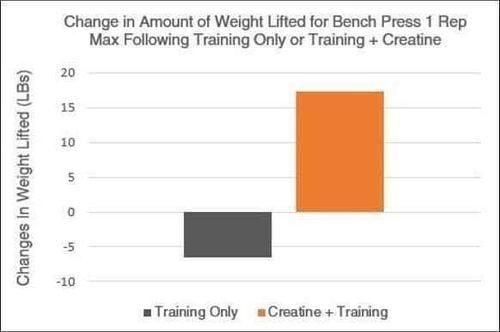
In addition, creatine has the ability to improve a number of biological processes, thereby helping the body develop maximum strength. The chart above is the result of a study that showed that the combination of weight training with the addition of creatine led to a large increase in the strength, or performance, of weight training. Many other studies and reviews have also confirmed this result, with average improvements of 5-10%.
5. Helps increase sprint performance
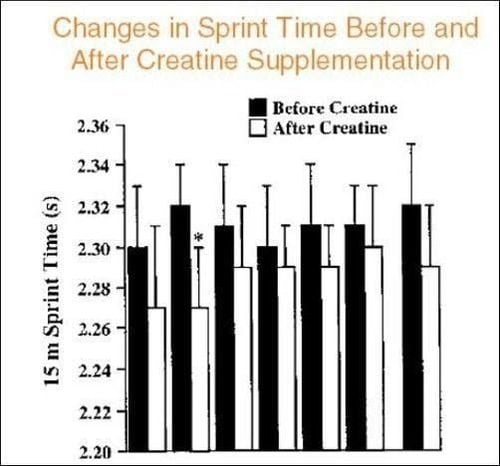
Several studies have shown that creatine supplementation can increase the sprint performance of highly trained soccer players. These players used 20 grams of creatine for 6 days, and the daily dose was 4/5 grams.
In the chart above, the 15 meter sprint time was reduced after just 6 days of using creatine. In addition, this supplement also helps to improve recovery and maintain sprint performance of athletes.
6. Reducing cognitive decline in the elderly
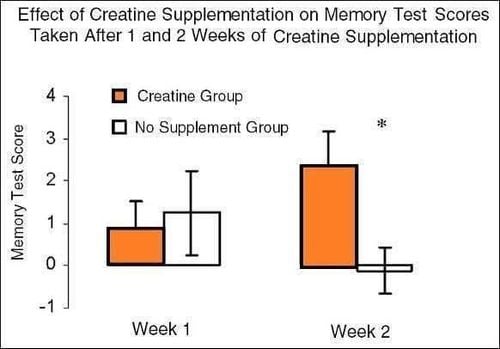
The chart above is the result of an evaluation study based on elderly subjects. They achieved much higher scores on long-term memory tests after two weeks of supplementing with creatine.
7. Improve cognitive function
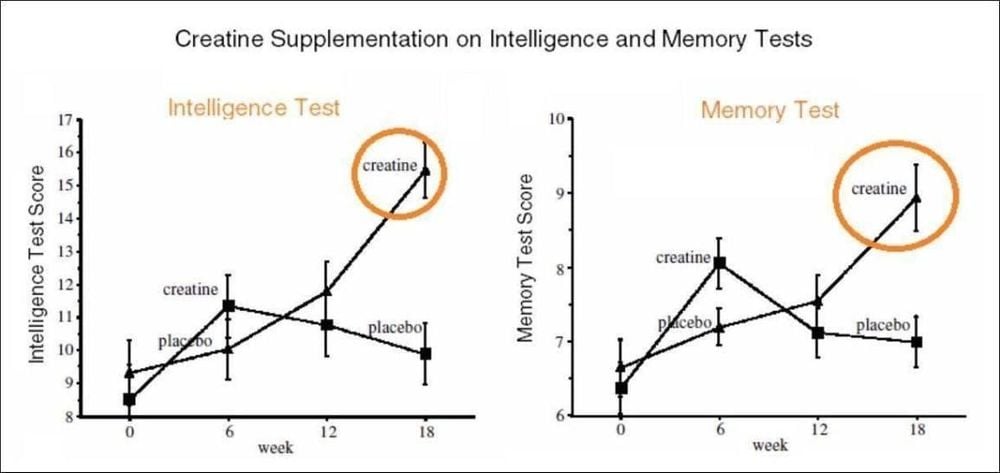
In the above study, everyone followed a vegetarian diet and took 5 grams of creatine per day for 6 weeks. From the chart above, people who took this supplement achieved much higher scores on both memory and intelligence tests than those who did not take it. In addition, blood tests also showed that the creatine levels of the participants in the assessment also increased significantly after creatine supplementation.
8. Reduce side effects of traumatic brain injury

This may be due to an increase in phosphocreatine storage in the brain and the maintenance of ATP at normal levels, both of which are likely to be reduced after traumatic brain injury.
9. Slows the progression of Parkinson's disease
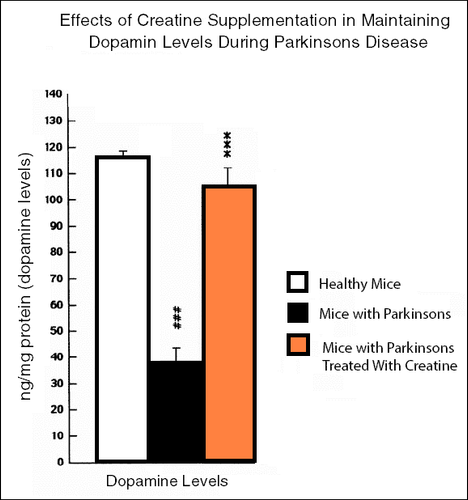
A test on rats has found that supplementing with creatine can help slow the progression of Parkinson's disease by slowing the decline in dopamine levels.
The chart above shows that the rats that did not receive creatine had a severe decrease in dopamine levels, while the group that used creatine usually only had a slight decrease.
While these results are promising, research has not yet confirmed the same effects in humans. Another study found that people with Parkinson's disease who took 10 grams of creatine per day for at least 5 years did not improve their symptoms or clinical outcomes.
10. Helps reduce blood sugar
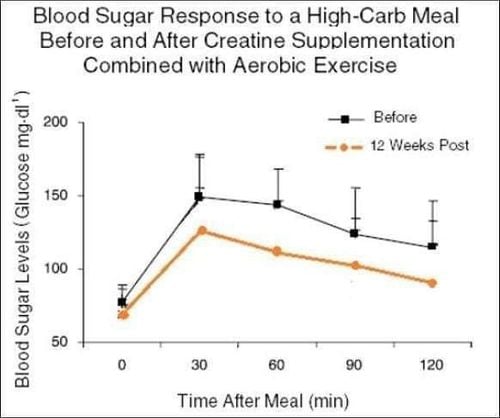
Some early research shows that creatine has the ability to lower blood sugar. The study also assessed how combining aerobic exercise with creatine use affects blood sugar levels.
Subjects of the trial consisted of 22 healthy people who took creatine or other placebo supplements for 3 months, and all participants did moderate aerobic exercise. The graph above shows that people taking creatine had a greater improvement in blood sugar response to high-carb meals than those taking a placebo.
Please dial HOTLINE for more information or register for an appointment HERE. Download MyVinmec app to make appointments faster and to manage your bookings easily.













